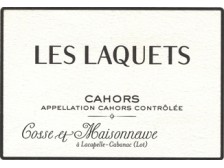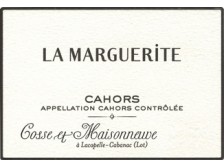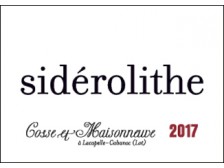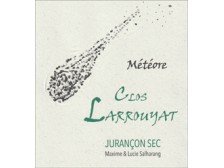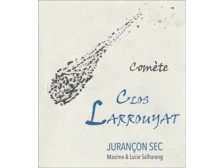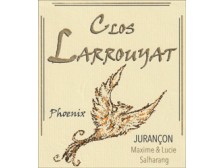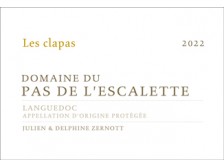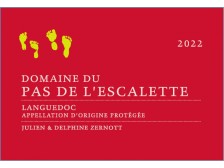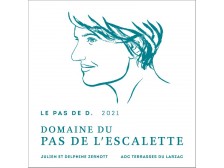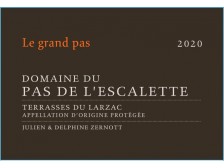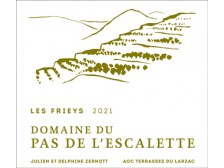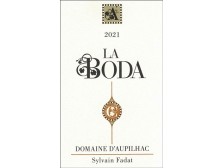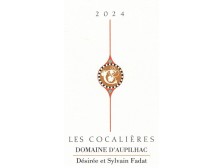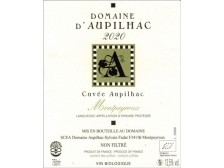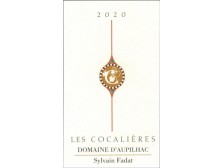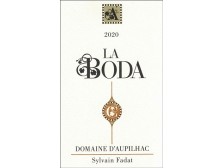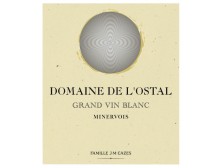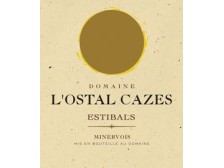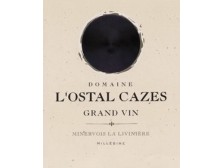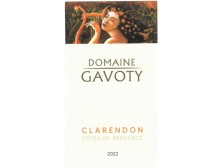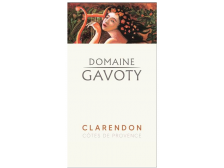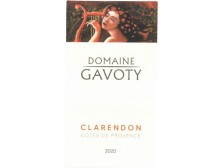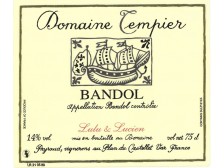Catalog
-
A new generation of winegrowers is waking Cahors up. Rustic wines with coarse tannins are a thing of the past. Make way for digestible, tasty, fruity and velvety malbecs. The duo Matthieu Cosse (the oenologist) / Catherine Maisonneuve (the winegrower) is part of this new Cadurian elite, with a magnificent range of wines where purity, precision and elegance prevail. "Transcending the boundaries of its appellation, the estate is one of the best in France" for Mr. Bettane.
Rated two stars in the 2021 Revue du Vin de France guide.
Cahors de caractère, Les Laquets is long and racy, with a persistent finish (cedar and black fruits), perfectly balanced by a fine and precise maturing. Perfect representation of the Cossse/ Maisonneuve style.
More- To keep or to drink:
- Ready to drink
- Apogée:
- 2026-2035
-
A new generation of winegrowers is waking Cahors up. Rustic wines with coarse tannins are a thing of the past. Make way for digestible, tasty, fruity and velvety malbecs. The duo Matthieu Cosse (the oenologist) / Catherine Maisonneuve (the winegrower) is part of this new Cadurian elite, with a magnificent range of wines where purity, precision and elegance prevail. "Transcending the boundaries of its appellation, the estate is one of the best in France" for Mr. Bettane.
Rated two stars in the 2021 Revue du Vin de France guide.
Cahors de caractère, Les Laquets is long and racy, with a persistent finish (cedar and black fruits), perfectly balanced by a fine and precise maturing. Perfect representation of the Cossse/ Maisonneuve style.
The 2020 vintage in the press:
La Revue du Vin de France (Guide 2026) : 95/100 "Old vines grafted onto part of the limestone scree slopes of Lacapelle-Cabanac, Les Laquets is still in its infancy: it displays primary notes and a mineral finish that promises long ageing potential."
More- To keep or to drink:
- Ready to drink
- Apogée:
- 2026-2036
-
A new generation of winegrowers is waking Cahors up. Rustic wines with coarse tannins are a thing of the past. Make way for digestible, tasty, fruity and velvety malbecs. The duo Matthieu Cosse (the oenologist) / Catherine Maisonneuve (the winegrower) is part of this new Cadurian elite, with a magnificent range of wines where purity, precision and elegance prevail. "Transcending the boundaries of its appellation, the estate is one of the best in France" for Mr. Bettane.
Rated two stars in the Revue du Vin de France guide.
La Marguerite is the prestigious cuvée of the Domaine, coming from a 2.5 hectare plot on the famous siderolithic terroir (clay-limestone mixed with reddish iron deposits). A wine of great potential where minerality vies with intensity. Splendid!
The 2022 vintage in the press:
La Revue du Vin de France (Guide 2026) : 97/100 "The entire range has a distinctive identity that stems as much from the precision of the ripeness as from a remarkable terroir. La Marguerite springs to mind in particular, with its pocket of ferruginous clay that is a source of longevity and aesthetic appeal."
More- To keep or to drink:
- Wait 1 to 2 years
- Apogée:
- 2027-2042
-
A new generation of winegrowers is waking Cahors up. Rustic wines with coarse tannins are a thing of the past. Make way for digestible, tasty, fruity and velvety malbecs. The duo Matthieu Cosse (the oenologist) / Catherine Maisonneuve (the winegrower) is part of this new Cadurian elite, with a magnificent range of wines where purity, precision and elegance prevail. "Transcending the boundaries of its appellation, the estate is one of the best in France" for Mr. Bettane.
Rated two stars in the Revue du Vin de France guide.
Sidérolithe is the 100% cabernet franc counterpart (on iron clay) of their other cuvée Marguerite which is 100% malbec. Its aromas of raspberry and violet and its velvety texture are immediately reminiscent of Pomerol.
The 2021 vintage in the reviews:
La Revue du Vin de France (December 2024): 94/100 “Catherine Maisonneuve and Matthieu Cosse were the first to reveal the potential of Cabernet Franc planted in the Quercy region on a pocket of clay. The great forgotten grape of Cahors, it displays here the austerity of the tannins that signal the cold 2021 vintage, but above all the aristocracy of this grape whose tasty fruit is revealed on a texture that suggests a radiant evolution held by the imprint of its terroir.”
More- To keep or to drink:
- Ready to drink
- Apogée:
- 2026-2040
-
A new generation of winegrowers is waking Cahors up. Rustic wines with coarse tannins are a thing of the past. Make way for digestible, tasty, fruity and velvety malbecs. The duo Matthieu Cosse (the oenologist) / Catherine Maisonneuve (the winegrower) is part of this new Cadurian elite, with a magnificent range of wines where purity, precision and elegance prevail. "Transcending the boundaries of its appellation, the estate is one of the best in France" for Mr. Bettane.
Rated two stars in the Revue du Vin de France guide.
Sidérolithe is the 100% cabernet franc counterpart (on iron clay) of their other cuvée Marguerite which is 100% malbec. Its aromas of raspberry and violet and its velvety texture are immediately reminiscent of Pomerol.
The 2020 vintage in the reviews:
La Revue du Vin de France (Guide 2026) : 93/100
More- To keep or to drink:
- Wait 1 to 2 years
- Apogée:
- 2028-2042
-
After a degree in chemistry, Maxime Salharang chose, somewhat by chance, to go into oenology. He trained in several great Bordeaux châteaux (Smith Haut-Lafitte, Carbonnieux) and was introduced to biodynamics at the Domaine de Souch in Jurançon, before going into his own vineyards at Clos Larrouyat (3 ha) with his wife Lucie. The full eastern exposure and the unique specificity of the subsoil (clay and pebbles rolled on a strip of Trias) give his wines a delicate freshness, intensity, minerality and length rare for the appellation. The work and thoughtful application of the Salharang couple convince us that Clos Larrouyat is a future great of the appellation.
Rated one star in the Revue du Vin de France guide (from 2026 onwards).
"Météore" is a blend of 30% gros manseng and 70% petit manseng, aged for 6 months in non-new barrels. Fresh and delicate, lively and intense, with a marked saline touch on the finish. Rated 92/100 in 2020 and 93/100 in 2021 by the 2023 guide of the Revue du Vin de France.
The 2024 vintage in the press:
La Revue du Vin de France (Guide 2026): 88/100
More- To keep or to drink:
- Ready to drink
- Apogée:
- 2026-2032
- Organic certification:
- 2015
-
After a degree in chemistry, Maxime Salharang chose, somewhat by chance, to go into oenology. He trained in several great Bordeaux châteaux (Smith Haut-Lafitte, Carbonnieux) and was introduced to biodynamics at the Domaine de Souch in Jurançon, before going into his own vineyards at Clos Larrouyat (3 ha) with his wife Lucie. The full eastern exposure and the unique specificity of the subsoil (clay and pebbles rolled on a strip of Trias) give his wines a delicate freshness, intensity, minerality and length rare for the appellation. The work and thoughtful application of the Salharang couple convince us that Clos Larrouyat is a future great of the appellation.
Rated one star in the Revue du Vin de France guide (from 2026 onwards).
"Comète" is a top-of-the-range cuvée: selection of free-run juice, 75% Petit Manseng (for the aromatic palette) and 25% Camaralet (for the structure in the mouth). A wine of irreproachable purity, complex and with a remarkable length, enhanced by the saline touch which is the trademark of the estate. Bravo !
The 2024 vintage in the press:
La Revue du Vin de France (Guide 2026): 87/100
More- To keep or to drink:
- Wait 1 to 2 years
- Apogée:
- 2028-2038
- Organic certification:
- 2015
-
After a degree in chemistry, Maxime Salharang chose, somewhat by chance, to go into oenology. He trained in several great Bordeaux châteaux (Smith Haut-Lafitte, Carbonnieux) and was introduced to biodynamics at the Domaine de Souch in Jurançon, before going into his own vineyards at Clos Larrouyat (3 ha) with his wife Lucie. The full eastern exposure and the unique specificity of the subsoil (clay and pebbles rolled on a strip of Trias) give his wines a delicate freshness, intensity, minerality and length rare for the appellation. The work and thoughtful application of the Salharang couple convince us that Clos Larrouyat is a future great of the appellation.
Rated one star in the Revue du Vin de France guide (from 2026 onwards).
"Comète" is a top-of-the-range cuvée: selection of free-run juice, 75% Petit Manseng (for the aromatic palette) and 25% Camaralet (for the structure in the mouth). A wine of irreproachable purity, complex and with a remarkable length, enhanced by the saline touch which is the trademark of the estate. Bravo !
The 2023 vintage in the press:
La Revue du Vin de France (Guide 2026): 91/100 "More colourful and fuller, the 2023 version of Comète is more to our liking. Despite powerful reduction, it is a delicate yet full-bodied, tangy, elongated wine that develops elegantly on the palate."
More- To keep or to drink:
- Ready to drink
- Apogée:
- 2026-2035
- Organic certification:
- 2015
-
After a degree in chemistry, Maxime Salharang chose, somewhat by chance, to go into oenology. He trained in several great Bordeaux châteaux (Smith Haut-Lafitte, Carbonnieux) and was introduced to biodynamics at the Domaine de Souch in Jurançon, before going into his own vineyards at Clos Larrouyat (3 ha) with his wife Lucie. The full eastern exposure and the unique specificity of the subsoil (clay and pebbles rolled on a strip of Trias) give his wines a delicate freshness, intensity, minerality and length rare for the appellation. The work and thoughtful application of the Salharang couple convince us that Clos Larrouyat is a future great of the appellation.
Rated one star in the Revue du Vin de France guide (from 2026 onwards).
The sweet "Phoenix", a 100% small manseng, is cloudy because of its low sugar content and its freshness. The aromatic intensity (verbena, pineapple, tangerine, citrus zest) of petit manseng is expressed without heaviness thanks to its tractable vivacity and its measured liquor.
The 2024 vintage in the press:
La Revue du Vin de France (Guide 2026): 90/100 "The subtle residual sugar in the Phoenix cuvée tempers this sharpness somewhat."
More- To keep or to drink:
- Wait 1 to 2 years
- Apogée:
- 2028-2038
- Organic certification:
- 2015
-
This is one of the most original estates in the Languedoc: for its altitude (350 m), on the southern edge of the Larzac plateau, and for its vineyards (2 ha of white and 18 ha of red) made up of old vines on around fifty terraces (like in the Douro) surrounded by stone walls and clapas (= piles of stones). Julien and Delphine Zernott, a passionate and determined couple, are at the helm of the estate, working hard to make the most of the cool, windy micro-climate of the Combe de l'Escalette to produce wines where freshness and sapidity are paramount.
A blend of white carignan, white grenache and terret bourret. Far from the southern cliché, Les Clapas stands out for its freshness and saline notes.
Domaine rated two stars in the Revue du Vin de France annual guide.
The 2022 vintage in the press:
La Revue du Vin de France (Guide 2025): 92/100 “Les Clapas blanc 2022 shows itself to be very fair in this warm year, textured but energetic, with beautiful bitters.”
More- To keep or to drink:
- Ready to drink
- Apogée:
- 2024-2028
- Organic certification:
- 2012
-
This is one of the most original estates in the Languedoc: by its altitude (350 m), on the southern edge of the Larzac plateau, and by its vineyard (2 ha in white and 18 ha in red) made up of old vines on fifty or so terraces (like in the Douro) surrounded by stone walls and clapas (= piles of stones). Julien and Delphine Zernott, a passionate and determined couple, are at the head of the estate. They are committed to exploiting their cool and windy micro-climate of the Combe de l'Escalette to produce organic wines where freshness and sapidity prevail.
Their range starts with Les Petits Pas, 40% grenache - 40% syrah - 20% carignan, a wine of pleasure, floral (supported by notes of cranberry and cranberry), on a velvety texture.Domaine rated two stars in the Revue du Vin de France annual guide.
The 2022 vintage is rated 90/100 by the Guide de la Revue du Vin de France 2024 "Les Petits Pas 2022 is perfectly at its place despite the warm vintage: crisp, fresh and peppery."
More- To keep or to drink:
- Ready to drink
- Apogée:
- 2024-2030
- Organic certification:
- 2012
-
This is one of the most original estates in the Languedoc: by its altitude (350 m), on the southern edge of the Larzac plateau, and by its vineyard (2 ha in white and 18 ha in red) made up of old vines on fifty or so terraces (like in the Douro) surrounded by stone walls and clapas (= piles of stones). Julien and Delphine Zernott, a passionate and determined couple, are at the head of the estate. They are committed to exploiting their cool and windy micro-climate of the Combe de l'Escalette to produce organic wines where freshness and sapidity prevail.
Le Pas de D. is the choice of Delphine Zernott, wishing to elaborate a wine with finesse, fresh and delicate. A blend of 50% carignan - 30% grenache - 20% cinsault, Le Pas de D. needs time and aeration to express itself at its best.Domaine rated two stars in the Revue du Vin de France annual guide.
The 2021 vintage is rated 93/100 by the Revue du Vin de France 2024 Guide "Le Pas de D. is smooth and juicy with morello cherry fruit, and also has a very nice brilliance".
More- To keep or to drink:
- Ready to drink
- Apogée:
- 2026-2033
- Organic certification:
- 2012
-
This is one of the most original estates in the Languedoc: by its altitude (350 m), on the southern edge of the Larzac plateau, and by its vineyard (2 ha in white and 18 ha in red) made up of old vines on fifty or so terraces (like in the Douro) surrounded by stone walls and clapas (= piles of stones). Julien and Delphine Zernott, a passionate and determined couple, are at the head of the estate. They are committed to exploiting their cool and windy micro-climate of the Combe de l'Escalette to produce organic wines where freshness and sapidity prevail.
Le Grand Pas is their great wine, 70% grenache - 20% cinsault - 10% carignan, an aesthete wine with a complex and refined nose (floral, sweet spices, precious woods), slender and tense despite a beautiful richness of background. No other great Languedoc wine displays such a combination of freshness/precision/velvety.
Domaine rated two stars in the Revue du Vin de France annual guide.
More- To keep or to drink:
- Ready to drink
- Apogée:
- 2026-2036
- Organic certification:
- 2012
-
This is one of the most original estates in the Languedoc: for its altitude (350 m), on the southern edge of the Larzac plateau, and for its vineyards (2 ha of white and 18 ha of red) made up of old vines on around fifty terraces (like in the Douro) surrounded by stone walls and clapas (= piles of stones). Julien and Delphine Zernott, a passionate and determined couple, are at the helm of the estate, working hard to make the most of the cool, windy micro-climate of the Combe de l'Escalette to produce wines where freshness and sapidity are paramount.
Les Frieys, made from a parcel of old Carignan, Mourvèdre and Grenache vines planted on terraces, is the estate's top cuvée. A dense, elegant wine of remarkable complexity, rated 96/100 by the Revue du Vin de France.
Domaine rated two stars in the Revue du Vin de France annual guide.
The 2021 vintage is rated 96/100 by the Revue du Vin de France 2024 Guide "The parcel of old vines of Carignan, Mourvèdre and Grenache which makes up Les Frieys once again offers us, in 2021, a graceful, powdery and sparkling wine of great complexity".
More- To keep or to drink:
- Wait 1 to 2 years
- Apogée:
- 2027-2038
- Organic certification:
- 2012
-
Sylvain Fadat started out by working the family's 5 hectares of vines, with the means at hand: vinification in tanker vats, limited ageing, bottling by hand... Convinced of the potential of the Montpeyroux appellation, he gradually enlarged his estate, built a winery, planted vines, converted to biodynamic viticulture...
Thirty years later, with his wife Désirée, he runs a 25-hectare estate, spread over two very distinct terroirs: the "hot" Aupilhac, made up of south-facing terraces on the edge of the garrigue, planted with Mediterranean grape varieties (mourvèdre and carignan) capable of withstanding the summer heat; and the "cool" Cocalières, a natural volcanic amphitheater situated at an altitude of 350 meters and facing north, home to the more sensitive grape varieties (syrah, grenache, marsanne...).
The estate has a two-star rating in the Revue du Vin de France guide, which praises the Fadat's "energy, respect for the environment and the precision of their wines".A link between the two terroirs, La Boda blanc is a blend of carignan and clairette from Aupilhac, with rolle, roussanne and marsanne from Cocalières : a well-balanced wine, between aromatic richness and mineral tension.
The 2021 vintage in the press:
Revue du vin de France (Guide 2024): Coups de coeur ♥ 94/100 “2021 fits La Boda blanc like a glove, with more tension than usual, delicately reduced, toasty and very fresh.”
More- To keep or to drink:
- Ready to drink
- Apogée:
- 2024-2030
- Organic certification:
- 2000
-
Sylvain Fadat started out by working the family's 5 hectares of vines, with the means at hand: vinification in tanker vats, limited ageing, bottling by hand... Convinced of the potential of the Montpeyroux appellation, he gradually enlarged his estate, built a winery, planted vines, converted to biodynamic viticulture...
Thirty years later, with his wife Désirée, he runs a 25-hectare estate, spread over two very distinct terroirs: the "hot" Aupilhac, made up of south-facing terraces on the edge of the garrigue, planted with Mediterranean grape varieties (mourvèdre and carignan) capable of withstanding the summer heat; and the "cool" Cocalières, a natural volcanic amphitheater situated at an altitude of 350 meters and facing north, home to the more sensitive grape varieties (syrah, grenache, marsanne...).
The estate has a two-star rating in the Revue du Vin de France guide, which praises the Fadat's "energy, respect for the environment and the precision of their wines".Freshness and precision distinguish Les Cocalières blanc, a blend of rolle (vermentino), roussanne, marsanne and grenache blanc on a north-facing terroir. According to the Bettane & Desseauve guide, “Splendid Cocalières blanc 2023, not to be missed”.
The 2024 vintage in the press:
La Revue du Vin de France (Guide 2026): 94/100 "Les Cocalières, we delve even deeper into the flesh of the year, here too refreshed with skill."
More- To keep or to drink:
- Ready to drink
- Apogée:
- 2026-2030
- Organic certification:
- 2000
-
Sylvain Fadat started out by working the family's 5 hectares of vines, with the means at hand: vinification in tanker vats, limited ageing, bottling by hand... Convinced of the potential of the Montpeyroux appellation, he gradually enlarged his estate, built a winery, planted vines, converted to biodynamic viticulture...
Thirty years later, with his wife Désirée, he runs a 25-hectare estate, spread over two very distinct terroirs: the "hot" Aupilhac, made up of south-facing terraces on the edge of the garrigue, planted with Mediterranean grape varieties (mourvèdre and carignan) capable of withstanding the summer heat; and the "cool" Cocalières, a natural volcanic amphitheater situated at an altitude of 350 meters and facing north, home to the more sensitive grape varieties (syrah, grenache, marsanne...).
The estate has a two-star rating in the Revue du Vin de France guide, which praises the Fadat's "energy, respect for the environment and the precision of their wines".Dense and suave, Aupilhac is the archetypal Languedoc wine, with its caressing aromas of garrigue and spices.
The 2023 vintage in the press:
La Revue du Vin de France (Guide 2026) : 91/100
More- To keep or to drink:
- Ready to drink
- Apogée:
- 2025-2032
- Organic certification:
- 2000
-
Sylvain Fadat started out by working the family's 5 hectares of vines, with the means at hand: vinification in tanker vats, limited ageing, bottling by hand... Convinced of the potential of the Montpeyroux appellation, he gradually enlarged his estate, built a winery, planted vines, converted to biodynamic viticulture...
Thirty years later, with his wife Désirée, he runs a 25-hectare estate, spread over two very distinct terroirs: the "hot" Aupilhac, made up of south-facing terraces on the edge of the garrigue, planted with Mediterranean grape varieties (mourvèdre and carignan) capable of withstanding the summer heat; and the "cool" Cocalières, a natural volcanic amphitheater situated at an altitude of 350 meters and facing north, home to the more sensitive grape varieties (syrah, grenache, marsanne...).
The estate has a two-star rating in the Revue du Vin de France guide, which praises the Fadat's "energy, respect for the environment and the precision of their wines".Dense and suave, Aupilhac is the archetypal Languedoc wine, with its caressing aromas of garrigue and spices.
More- To keep or to drink:
- Ready to drink
- Apogée:
- 2025-2033
- Organic certification:
- 2000
-
Sylvain Fadat started out by working the family's 5 hectares of vines, with the means at hand: vinification in tanker vats, limited ageing, bottling by hand... Convinced of the potential of the Montpeyroux appellation, he gradually enlarged his estate, built a winery, planted vines, converted to biodynamic viticulture...
Thirty years later, with his wife Désirée, he runs a 25-hectare estate, spread over two very distinct terroirs: the "hot" Aupilhac, made up of south-facing terraces on the edge of the garrigue, planted with Mediterranean grape varieties (mourvèdre and carignan) capable of withstanding the summer heat; and the "cool" Cocalières, a natural volcanic amphitheater situated at an altitude of 350 meters and facing north, home to the more sensitive grape varieties (syrah, grenache, marsanne...).
The estate has a two-star rating in the Revue du Vin de France guide, which praises the Fadat's "energy, respect for the environment and the precision of their wines".Cocalières, with its long finish, is fresher and racier than Aupilhac, with subtle smoky notes.
The 2022 vintage in the press:
La Revue du Vin de France (Guide 2026): 94/100 "The great vintages of 2022 are deep, sensual and magical: Les Cocalières still has plenty of freshness in reserve."
More- To keep or to drink:
- Ready to drink
- Apogée:
- 2025-2033
- Organic certification:
- 2000
-
Sylvain Fadat started out by working the family's 5 hectares of vines, with the means at hand: vinification in tanker vats, limited ageing, bottling by hand... Convinced of the potential of the Montpeyroux appellation, he gradually enlarged his estate, built a winery, planted vines, converted to biodynamic viticulture...
Thirty years later, with his wife Désirée, he runs a 25-hectare estate, spread over two very distinct terroirs: the "hot" Aupilhac, made up of south-facing terraces on the edge of the garrigue, planted with Mediterranean grape varieties (mourvèdre and carignan) capable of withstanding the summer heat; and the "cool" Cocalières, a natural volcanic amphitheater situated at an altitude of 350 meters and facing north, home to the more sensitive grape varieties (syrah, grenache, marsanne...).
The estate has a two-star rating in the Revue du Vin de France guide, which praises the Fadat's "energy, respect for the environment and the precision of their wines".La Boda, which means “marriage” in Spanish a blend of the estate's two terroirs: syrah from Cocalières and mourvèdre from Aupilhac. Designed for ageing, it combines spicy notes (zan, vanilla) and a velvety mouthfeel.
More- To keep or to drink:
- Ready to drink
- Apogée:
- 2025-2035
- Organic certification:
- 2000
-
Sylvain Fadat started out by working the family's 5 hectares of vines, with the means at hand: vinification in tanker vats, limited ageing, bottling by hand... Convinced of the potential of the Montpeyroux appellation, he gradually enlarged his estate, built a winery, planted vines, converted to biodynamic viticulture...
Thirty years later, with his wife Désirée, he runs a 25-hectare estate, spread over two very distinct terroirs: the "hot" Aupilhac, made up of south-facing terraces on the edge of the garrigue, planted with Mediterranean grape varieties (mourvèdre and carignan) capable of withstanding the summer heat; and the "cool" Cocalières, a natural volcanic amphitheater situated at an altitude of 350 meters and facing north, home to the more sensitive grape varieties (syrah, grenache, marsanne...).
The estate has a two-star rating in the Revue du Vin de France guide, which praises the Fadat's "energy, respect for the environment and the precision of their wines".Le Clos, old vines of carignan (40%), mourvèdre (40%) and syrah (20%) on clay, is their great cuvée for laying down, fermented in wooden vats then aged 30 months in barrels.
More- To keep or to drink:
- Wait 1 to 2 years
- Apogée:
- 2028-2042
- Organic certification:
- 2000
-
Vineyard acquired in 2002 by Mr. Cazes (Lynch-Bages, Haut-Batailley, Ormes de Pez...). After having shown at the beginning a very southern character with exuberant and full-bodied wines, L'Ostal Cazes has since happily moved to a more nuanced style where, without losing anything in density, elegance competes with length.
Grand Vin Blanc sec comes from a parcel (2.5 ha) of south-east-facing marl-clay at the foot of the hillside, 40% marsanne, 40% roussanne for volume on the palate, complemented by viognier and muscat for aromatic intensity, refined and rounded (with a touch of vanilla) by 7 months' ageing in 2-wine barrels. As the name suggests, this is a great white wine, with more Rhône (northern) than southern accents.
More- To keep or to drink:
- Ready to drink
- Apogée:
- 2024-2030
- Organic certification:
- 2024
-
Vineyard acquired in 2002 by Mr Cazes (Lynch-Bages, Haut-Batailley, Ormes de Pez...). After starting out with a very southern character with exuberant, full-bodied wines, L'Ostal has since happily moved on to a more nuanced style where, without losing any of its density, elegance competes with length. A Bordeaux vision and assuaged of the generosity even the Mediterranean exuberance, greeted by Mr. Bettane " A very beautiful address, serious and regular, of which one does not tire".
Estibals, 50% Syrah, is a gourmet wine, balanced, long, everything but a "little wine".More- To keep or to drink:
- Ready to drink
- Apogée:
- 2024-2032
- Organic certification:
- 2024
-
Vineyard acquired in 2002 by Mr Cazes (Lynch-Bages, Haut-Batailley, Ormes de Pez...). After starting out with a very southern character with exuberant, full-bodied wines, L'Ostal has since happily moved on to a more nuanced style where, without losing any of its density, elegance competes with length. A Bordeaux vision and assuaged of the generosity even the Mediterranean exuberance, greeted by Mr. Bettane " A very beautiful address, serious and regular, of which one does not tire".
Estibals, 50% Syrah, is a gourmet wine, balanced, long, everything but a "little wine".More- To keep or to drink:
- Ready to drink
- Apogée:
- 2024-2032
- Organic certification:
- 2024
-
Vineyard acquired in 2002 by Mr Cazes (Lynch-Bages, Haut-Batailley, Ormes de Pez...). After starting out with a very southern character with exuberant, full-bodied wines, L'Ostal has since happily moved on to a more nuanced style where, without losing any of its density, elegance competes with length. A Bordeaux vision and assuaged of the generosity even the Mediterranean exuberance, greeted by Mr. Bettane " A very beautiful address, serious and regular, of which one does not tire".
Grand Vin, 70% Syrah, is today simply one of the greatest red wines in Languedoc.More- To keep or to drink:
- Wait 1 to 2 years
- Apogée:
- 2028-2032
- Organic certification:
- 2024
-
Vineyard acquired in 2002 by Mr Cazes (Lynch-Bages, Haut-Batailley, Ormes de Pez...). After starting out with a very southern character with exuberant, full-bodied wines, L'Ostal has since happily moved on to a more nuanced style where, without losing any of its density, elegance competes with length. A Bordeaux vision and assuaged of the generosity even the Mediterranean exuberance, greeted by Mr. Bettane " A very beautiful address, serious and regular, of which one does not tire".
Grand Vin, 70% Syrah, is today simply one of the greatest red wines in Languedoc.More- To keep or to drink:
- Ready to drink
- Apogée:
- 2026-2036
- Organic certification:
- 2024
-
Family estate of the late Bernard Gavoty, alias Clarendon, great music critic of the 60s. Its spearhead, the Clarendon cuvée, is one of the greatest whites of Provence, 100% rolle grape variety that he was the first to plant in Provence. Quoted in the Revue du Vin de France's guide, with the comment "the Clarendon vintage is the symbol of what a great Provencal white wine can be".
Clarendon white, pure rolle (= vermentino or Corsican malvoisie), matured without wood to stay as close as possible to the freshness and brightness of the fruit (pear, pineapple, aniseed...). This white wine has an ample and fat structure which allows it to age admirably for 10 years and more, with noble bitters (petroleum nuances).The 2022 vintage in the press:
La Revue du Vin de France (Guide 2025): 92/100 “The step is higher with Clarendon, where the terroir of Grand Campdumy takes on its full meaning [...] 2022 is starting to deliver the concentrated juice of rolle, its roundness and affable notes of ripe fruit.”
More- To keep or to drink:
- Ready to drink
- Apogée:
- 2025-2035
- Organic certification:
- 2020
-
Family estate of the late Bernard Gavoty, alias Clarendon, great music critic of the 60s. Its spearhead, the Clarendon cuvée, is one of the greatest whites of Provence, 100% rolle grape variety that he was the first to plant in Provence. Quoted in the Revue du Vin de France's guide, with the comment "the Clarendon vintage is the symbol of what a great Provencal white wine can be".
Rosé de saignée, 70% Grenache for roundness and 30% Cinsault for freshness, Clarendon is a true gourmet rosé, intense and made for the table, more at ease after 2 to 3 years' bottle ageing.
The 2023 vintage in the press:
La Revue du Vin de France (Guide 2025): 91/100 “Clarendon rosé opens juicy to a dynamic, mineral and racy finish.”
More- To keep or to drink:
- Ready to drink
- Apogée:
- 2025-2028
- Organic certification:
- 2020
-
Family estate of the late Bernard Gavoty, alias Clarendon, great music critic of the 60s. Its spearhead, the Clarendon cuvée, is one of the greatest whites of Provence, 100% rolle grape variety that he was the first to plant in Provence. Quoted in the Revue du Vin de France's guide, with the comment "the Clarendon vintage is the symbol of what a great Provencal white wine can be".
Clarendon red, a blend of 95% Syrah and 5% Cabernet Sauvignon. A serious red wine, full-bodied, powerful while remaining perfectly defined and balanced (no heaviness, no alcoholic sensation). Certainly armed for a long and beautiful ageing.More- To keep or to drink:
- Wait 1 to 2 years
- Apogée:
- 2028-2036
- Organic certification:
- 2020
-
An iconic and historic Bandol estate, in the hands of the Tempier family for nearly 2 centuries. It was Lucien Peyraud, husband of Lucie Tempier, who, from 1945 onwards and as President of Bandol wines, fought to impose Mourvèdre (minimum 50%) in the appellation. Despite their natural concentration and power, the estate's reds are distinguished, refined and harmonious, with an ageing potential worthy of the greatest Rhône wines.
Rated three stars in the Revue du Vin de France guide.
Cuvée Lulu et Lucien, named after the Tempier family's forebears, is the estate's classic cuvée, a blend of the estate's different terroirs (the famous 'restanques', clay-limestone terraces overlooking the Mediterranean), vines aged 30 years or more, 75% Mourvèdre.The 2023 vintage in the press:
La Revue du Vin de France (Guide 2026) : "Lulu et Lucien (named in honour of the estate's founders) is an entry-level cuvée with the depth typical of Bandol. Bright fruitiness and a texture that reveals perfect balance in 2023."
More- To keep or to drink:
- Wait 3 to 5 years
- Apogée:
- 2030-2042



